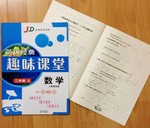题目内容
Is ________ he told you really interesting?
- A.that
- B.which
- C.what
- D.this

 黄冈经典趣味课堂系列答案
黄冈经典趣味课堂系列答案 启东小题作业本系列答案
启东小题作业本系列答案
Driving home from work one evening in the heavy rain, I found a very wet, injured cat on the side of the road. He looked up at me, meowing pitifully. A car must have hit it so it wasn’t able to move. I stopped my car and carried the cat in and went on driving.
At the nearest vet clinic, the vet gently examined it. "He's about eight months old and has two broken legs, but I would need X-rays to know how serious the damage is," he told me. "As he's not your cat, I don't know if you want to go ahead with this. It could be rather expensive."
I knew it would cost me hundreds of dollars, but I agreed with his advice. The following morning the vet rang to say the X-rays confirmed two bad breaks in his legs. "I'll operate on his legs and put metal pins in them to keep them fixed." he told me.
That afternoon I went to pick up my little friend. There I could hardly recognize him. His previously dirty fur was now a beautiful silver grey. His front legs were in two casts and he lay there looking at me, purring(发咕噜声) happily.
I thanked the doctor and went out to pay the bill. "I think you've given me the wrong account," I said to the clerk. "This is only $85. He's had X-rays and an operation on his legs." "No, that's right," she replied. "The vet has only charged you for the medication. There's a message on the bottom."
Written under the total were the words "SPECIAL RATE FOR ADOPTIONS." I was speechless at his kind and generous gesture. I paid the account and under his message I wrote "WITH GRATEFUL THANKS, CAT AND MUM."
【小题1】Why didn’t the vet give the cat X-rays immediately?
| A.The damage was not serious at all. |
| B.The cat was too young to be X-rayed. |
| C.The doctor wasn’t sure whether the author would like to cover the expenses. |
| D.The examination was too expensive for the author to afford. |
| A.The author was a caring and generous lady. |
| B.The author often adopted animals. |
| C.The author’s workplace was far from home. |
| D.The author only worked at night. |
| A.He was deserted by his owner and nearly starved to death. |
| B.He was saved on a dark and stormy night. |
| C.He was a lively creature with beautiful brown fur. |
| D.His back legs were broken and had to have an operation. |
| A.The adventure of a cat |
| B.An impressive vet |
| C.An unforgettable night |
| D.Love in relays |
| 完形填空。 | ||||
| Mr. smith taught eighth-grade science. On the first day of class, he gave us a(an) 1 about a creature called the cattywampus, an animal that 2 during the Ice Age. He passed around a skull (头骨) as he talked. We all took notes and 3 had a test. When he returned my paper, I was 4 . There was a big red "×" through 5 of my answers. I had failed. There 6 have been some mistake! I had written down what Mr. Smith said. Then I 7 that everyone in the class had failed. What had happened? "Very simple." Mr. Smith said. He had 8 all those things about cattywampus. There had 9 been any such animal. The information in our 10 was wrong. Did we expect praise for a wrong answer? We were very 11 . What kind of test "You should have figured it out", Mr. Smith said. At the very moment he was passing around that cattywampus skull, hadn't he been telling us that no trace of the animal 12 ? He had described its color and other facts he couldn't have known. He had given the animal a strange name, and we still hadn't 13 . He said that the 14 on our papers would be recorded in the grade book. And they were. Mr. Smith said he hoped we would learn something from this 15 . Teachers and notebooks are not very 16 . In fact, no one is. He told us not to let our minds go to sleep and to 17 up if we ever thought he or the textbook was wrong. I haven't made any great scientific discoveries, 18 Mr. Smith's class gave me and my classmates something just as important: the 19 to look people in the eye and tell them 20 wrong. | ||||
|
Mr. Whitson taught sixth-grade science. On the first day of class, he gave us a lecture about an animal called the Cattywampus, which died out during the Ice Age. He ___1___ us a skull (头骨) as he talked. We all took ___2___ and later had a quiz.
When he returned my paper, I was __3__. There was a big red “X” through ___4___ of my answers. I had failed. There had to be some ___5__! I had written down ___6___ what Mr. Whitson said.
Then I realized that everyone in the class had ___7___. What had happened? Very simple, Mr. Whitson explained. He had __8___ that story about the Cattywampus. There had ___9__ been any such animal. The information in our notes was, __10__, incorrect. Did we __11___ credit (学分) for incorrect answers?
Needless to say, we were angry. What kind of test was this? And what kind of _12__?
We should have worked it out, Mr. Whitson told us. ___13___, at the very moment he was passing around the Cattywampus skull (in truth, a cat’s), hadn’t he been telling us that no trace (踪迹) of the animal _14__? He had given the animal a _15____ name, and we still hadn’t doubted about that. The zeroes on our papers would be ___16___ in his grade book, he said. And they were.
Mr. Whitson said he hoped we would learn something ___17___ this experience. Teachers and textbooks are not always __18__. In fact, no one is. He told us not to let our __19___ go to sleep, and to speak up if we ever thought he or the textbook was wrong.
Every class was a(n) ___20___ with Mr. Whitson. I can still remember some science periods almost from beginning to end.
1.A.drew B.described C.showed D.brought
2.A.notice B.notes C.a breath D.interest
3.A.shocked B.happy C.angry D.strange
4.A.some B.each C.many D.none
5.A.regrets B.surprise C.difficulty D.mistakes
6.A.exactly B.immediately C.completely D.generally
7.A.passed B.failed C.understood D.worried
8.A.prepared for B.heard about C.dealt with D.made up
|
10.A.therefore B.finally C.however D.yet
11.A.give B.pay C.hope D.expect
12.A.subject B.school C.teacher D.animal
13.A.After all B.Once again C.Above all D.In all
14.A.left B.kept C.remained D.followed
15.A.ridiculous B.common C.great D.wrong
16.A.removed B.forgotten C.ranked D.recorded
17.A.from B.in C.about D.by
18.A.equal B.practical C.right D.up-to-date
19.A.imagination B.hearts C.eyes D.minds
20.A.adventure B.dream C.game D.story